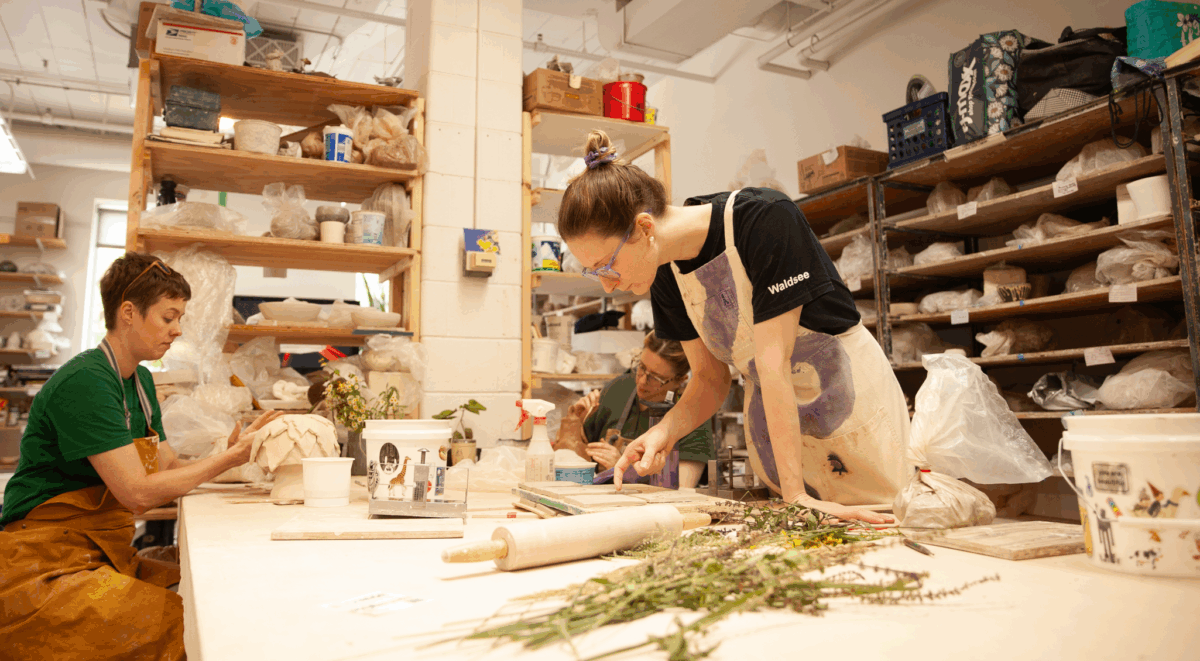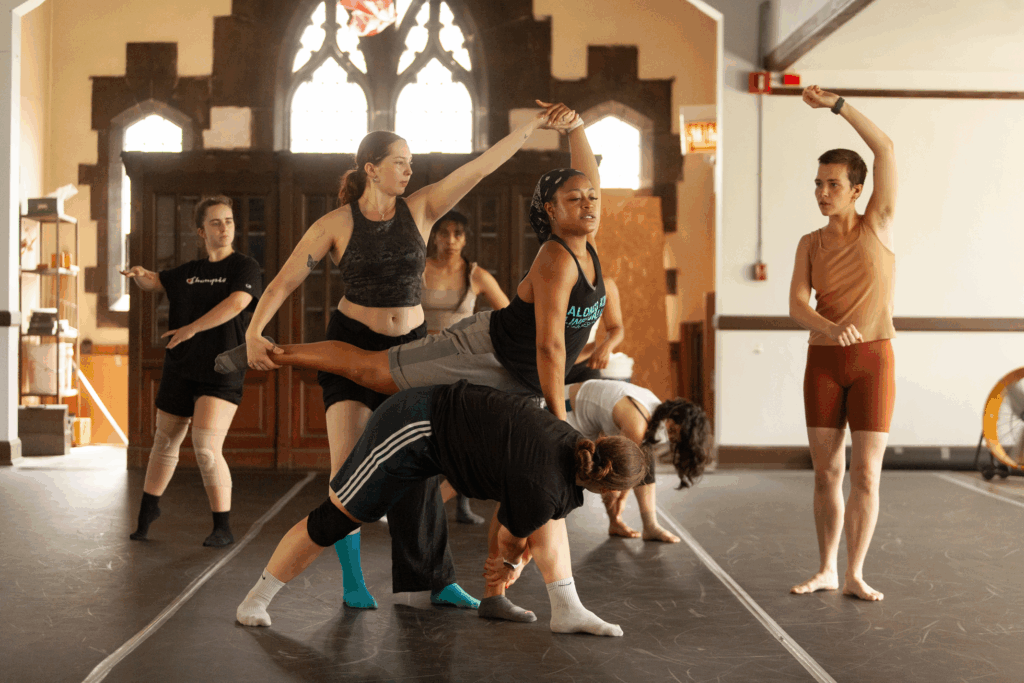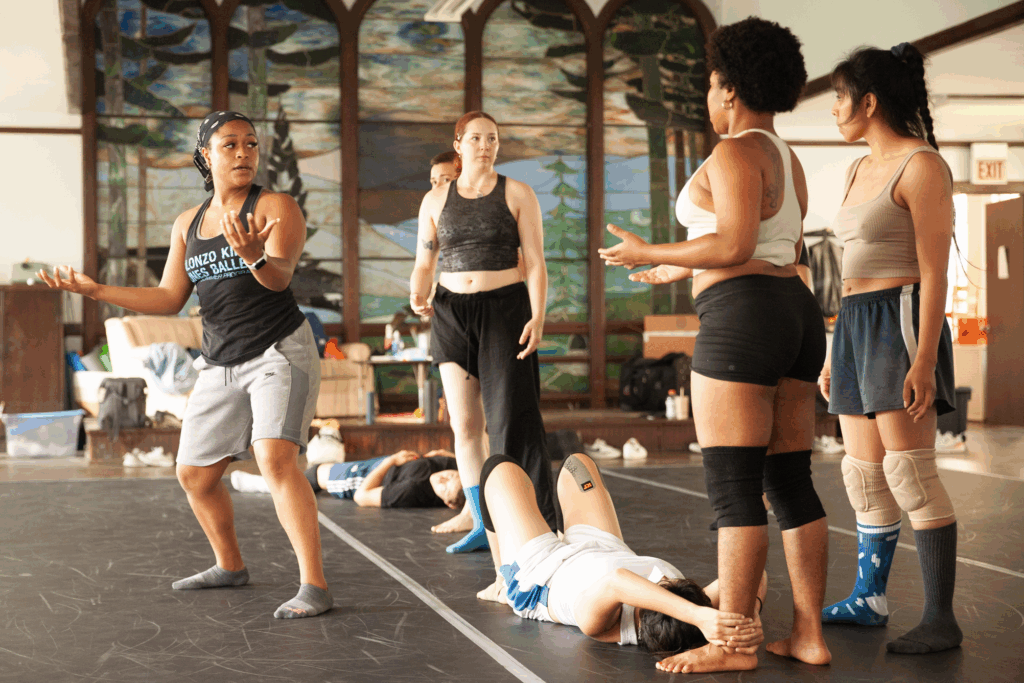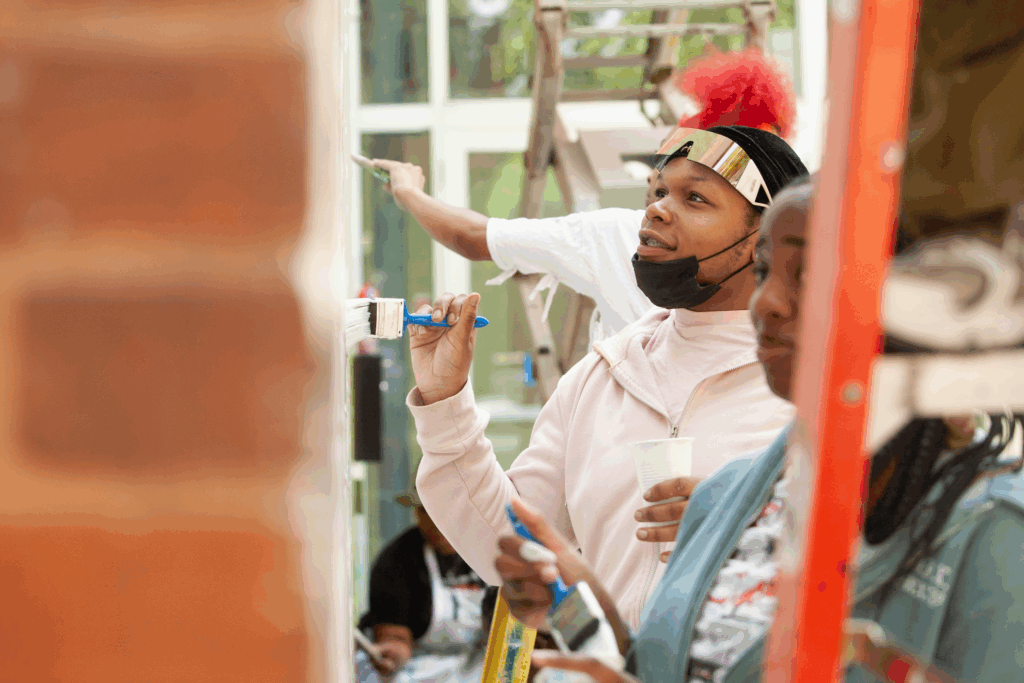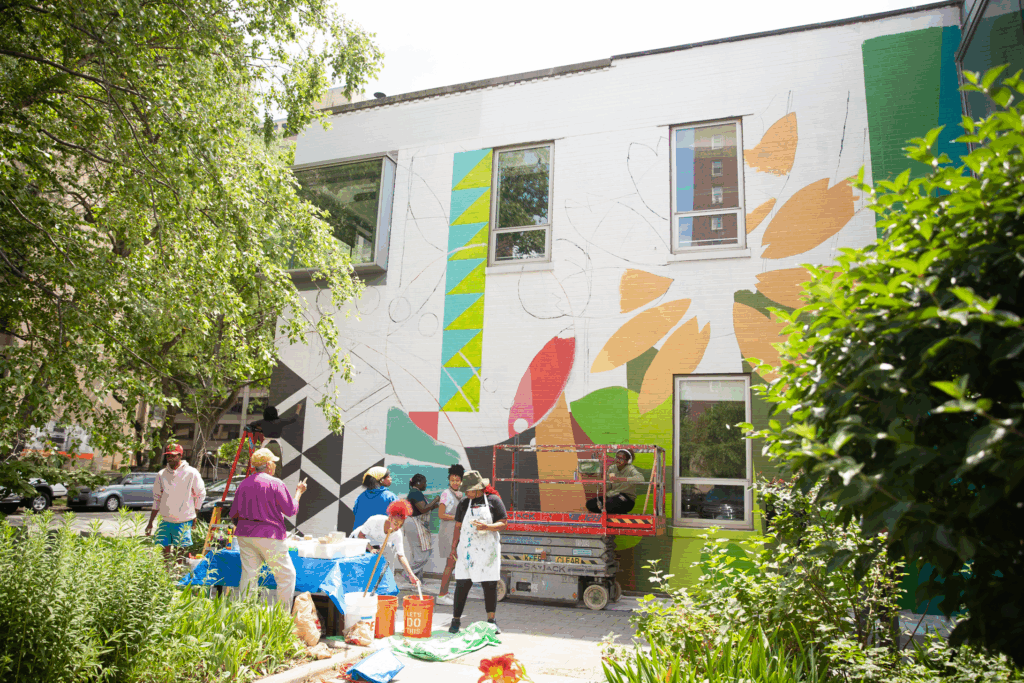A career of dancing throughout the city and across the country taught Tyler Thompson how exclusive the craft could be. But Thompson, who started dancing as a child at the South Side’s Mayfair Performing Company, emerged well prepared to choreograph her own ensemble that includes her community.
“I was thinking about the limitations of poverty, and how everything you need to have a healthy and happy life is behind a paywall,” Thompson said. “I didn’t want what I produced to also be behind a paywall… so I set up the 773 Dance Project, where all of our shows would be donation based, and we would exclusively perform in neighborhoods on the South and West Sides of the city, so that we were in the areas where they don’t get a lot of dance programming.”
After years of grassroot fundraising efforts and dance education partnerships, 773 Dance Project is now housed in Woodlawn inside of a church full of community-based organizations, paying its dancers to rehearse twice a week and perform in several shows a year. In January, it was even selected as a recipient of a 2025 National Endowment for the Arts (NEA) Grant. But like many arts organizations, after President Donald Trump took office, 773 Dance Project was hit with a new obstacle: it was informed that its NEA funding was being rescinded, abruptly removing thousands of dollars from its budget.
Out of the eighty NEA grants that were originally presented to Chicagoans during the last week of Biden’s presidency, at least thirteen went to organizations based on the South Side, with many also going to citywide efforts that have a wide South Side footprint. Amid a tumult of changes to NEA programs and grant cuts, and as tension remains high between the City of Chicago and the White House, federally supported art organizations across the city must reassess how to continue their work without relying on support from Trump’s NEA. South Side organizations have drawn on a history of ingenuity and resilience, collaborating with each other and leaning on community support to find ways to respond.
773 Dance Project lost its grant during an escalating series of threats to federal arts funding. Roughly two weeks into Trump’s second term, amid a wave of anti-DEI policy changes from his administration, the NEA discontinued the Challenge America program, which supported small projects in underserved communities. Days later, it announced new rules prohibiting grant applicants from operating programs “promoting ‘diversity, equity, and inclusion’ (DEI) that violate any applicable federal anti-discrimination laws” or from using federal funds to promote what it referred to as “gender ideology.” Then, in May, it simply began terminating grants and rescinding grant offers. In order to now receive funding from the NEA, the notices indicated, organizations must prove that their project increases AI literacy for the public, highlights minority-serving colleges and universities, supports the health and well-being of people and communities, or celebrates next year’s 250th anniversary of the Declaration of Independence.
With the $10,000 NEA grant, Thompson and her dance company were going to revive A Bronzeville Nutcracker, a South Side take on the classic Christmastime ballet that ran in the 2010s at the Harold Washington Cultural Center. Thompson’s childhood friend and co-executive artistic director, Pauline Mosley, was taught by the show’s creator, who was excited by the prospect of its resurgence. While some organizations have applied for the next year’s round of NEA funding under the new guidelines and some have decided not to, the Challenge America grant that 773 Dance Project received was canceled entirely, meaning they would have to apply for funding from the NEA’s more general Grants for Arts Projects program instead.
Enthusiasm is still strong to bring the show back, even though 773 Dance Project’s team isn’t relying on getting the federal funding again. They are confident that collaboration with community and industry partners will keep it alive.
“We still want to do [A Bronzeville Nutcracker]; we just are thinking about other ways [to] still get it done,” Thompson said. Kia Smith of South Chicago Dance Theater, a mentor to Thompson and Mosley, has been helping them brainstorm. “She’s been like, ‘All right, so… how are we doing your Bronzeville Nutcracker? Let’s figure it out!” Thompson said. “It’s definitely still gonna happen. It just might happen next year.”
Two bus rides away in South Chicago, another organization hit by the cuts, SkyART, had been receiving NEA grants for thirteen years until its funding was rescinded this year. Its programming, much of which developed organically from day-to-day interactions with the families of their attendees and observing their needs, promotes creativity within youth as a skill. The produce from its Artist’s Garden is used to make meals for its Family Table Program, which provides nutritious snacks and meals for its SkyWAY and Project 3rd Space programs. Federal funding was a significant support for SkyART’s general programming—its withdrawn NEA grant had been for $40,000—though not consequential enough to impact any daily operations for participants.
Jalen Taylor, SkyART’s Director of Development, appreciated the collaborative approach by members of Arts Alliance Illinois, which developed a “Federal Rapid Response” package with resources for new funding and community responses for art organizations affected by the sweeping changes to NEA funding.
“I’ve sat on several calls with different organizations impacted by the NEA funding where we’re trying to figure out how to support one another,” Taylor said. “The community has been great during this transition, which I feel keeps the momentum up as we’re all trying to do our own individual missions. We’re all still here trying to navigate the changes that are happening.”
Those changes are inseparable from the rest of the president’s agenda. On his first day, Trump issued executive orders that attempted to establish a false gender binary and eliminated programming related to diversity, equity, and inclusion; both have been specifically mentioned to fiscal year 2025 Grants for Arts Projects grant winners across the country. Many of SkyART’s 1,500 annual participants are local to its South Chicago home and new West Garfield Park location. For SkyART, it’s easy to see how for its families, the impact of federal policy changes and funding cuts goes far beyond art programming.
“We know what’s happening within the households of the constituents that are being impacted by all of the things happening just even outside of this,” Taylor said. “This is your safe space to be able to kind of take a pause or take a break from that.”
Leading up to the July 17 deadline for Grants for Arts Projects applications for fiscal year 2026, many 2025 recipients struggled with recouping their current losses while considering whether to continue applying for NEA funding. Organizations have different levels of dependency on these federal grants, which can determine whether it’s worth the trouble of reapplying despite the programs’ shifts or preferable to seek funding through different avenues.
In addition to dealing with a canceled NEA grant for 2025, the Hyde Park Art Center expressly decided that it would not compromise its mission in order to comply with anti-equity executive orders, and thus would not seek federal support next year. It was one of many local nonprofits that leaned on their communities this spring to cover deficits caused by not being able to rely on federal funding. HPAC’s NEA grant supported its exhibitions, residencies, and professional development programs, and they will all continue as planned. Co-Executive Director Jen Tremblay Chambers is grateful for the art center’s financial security.
“For Hyde Park Art Center, we’re in the position where [$50,000] is impactful, but it’s not existential to our organization. One of the things that we want to be really clear about is that the decision not to apply for NEA was the best decision for us, but this kind of loss of funding is putting art leaders in impossible situations,” Chambers said. “What decision is right for Hyde Park Art Center isn’t necessarily going to be the right decision for another nonprofit. People are doing the best they can to make sure that their programs can run and their communities continue to be supported.”
After the art center lost its support from the NEA, which until that point had been perennially growing, it had a record-breaking Spring Appeal fundraiser, powered by its strong stance on maintaining inclusive values at the historic contemporary arts hub. In addition to NEA funding issues, the fundraiser highlighted the Hyde Park Art Center’s groundbreaking commitment to a contribute-what-you-can model.
Chambers wants people to remember the value that arts and arts organizations bring to communities while art leaders are making difficult decisions about the futures of their local programming: “If someone’s been positively impacted by Hyde Park Art Center, or another organization, or if people are inspired by the work that we do, we hope that people will show up, participate, contribute, and be a part of that solution.”
But it’s not only larger organizations that are forgoing this year’s NEA application cycle. As a two-friend operation, the 773 Dance Project team is not sure if they’re best served by applying again when their energy can go more actively towards increasing access to dance.
“We are very spread thin. We do this full-time and we are not paid full-time salary… so everything that we spend time doing has to be worth our time,” Thompson said. “It’s this debate: do I even want to spend my time doing this when I know this administration is not trustworthy? They may decide, ‘We’re scrapping the whole Grants for Arts [Projects] program, we don’t want to give any money to the arts.’ Anything can happen.”
Over the summer, 773 Dance Project eventually did appeal its grant revocation. The NEA accepted its appeal, as it adhered to two of the new stipulations: empowering houses of worship to serve communities, and helping Americans become healthier.
Despite the uncertainty, among the bevy of recent federal orders, laws, and policies that are changing how lives are lived, 773 Dance Project, Hyde Park Art Center, and SkyART join art organizations everywhere as they strive to maintain a seamless routine of programming for their communities. The Chicago Department of Cultural Affairs and Special Events (DCASE) is also helping fill the gaps with its Arts Relief Fund, offering grants up to $25,000 for organizations that lost their federal funding—another testament to Chicago’s dedication to the arts and humanities.
SkyART was founded almost twenty-five years ago by an art therapist as an effort to use creative outlets as a resource for South Chicago residents, and Taylor, the director of development, still affirms the power that comes from creativity.
“We need to continue to imagine, and we need to continue to advocate for arts and creativity because it’s crucial for our survival. It’s the way that we got here and it’s the way that we’ll end,” she said. “There’s nothing that you touch, see, feel, or experience that wasn’t created by somebody. If we continue to honor that principle, at the end of the day, we’ll continue to press forward as a community.”
Davon Clark is a Philadelphia-raised artist based in Chicago who uses investigative journalism practices in his camerawork and poetry. His work looks to fill in the gaps left behind in coverage of the worlds that he lives in. He currently serves as the communications manager at Precious Blood Ministry of Reconciliation in Back of the Yards.

